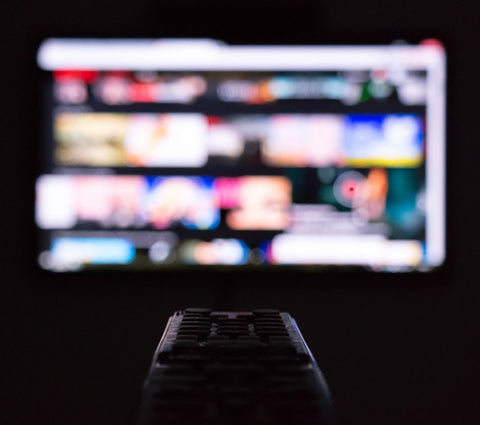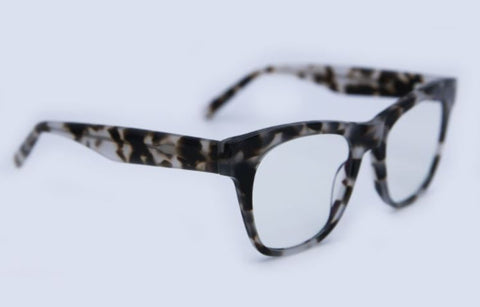Shades provide all-around protection from all sorts of light sources – especially the harmful rays of the sun. But did you know that there are some lights that we need protection from, even when we’re inside the house?
Yep, those countless hours behind the computer, your smart phone, Netflix may be having a damaging effect on ours. Now, this damage isn’t the age-old story your folks used to tell you – that your eyes will go square if you sit too close to the TV. No, this damage is caused by the blue light that is emitted from the electronic devices we have packed our lives with.
Today, we’re going to talk about blue light and what it can do to your eyes. But first, let’s talk about what this blue light even is.
Blue Light – What is it and what does it do?
You might have only really started hearing about blue light in the last few years – as your time behind screens increased, perhaps your headaches have as well.
You may not be aware of this, but blue light is actually part of the visible light spectrum and is light we can physically see as opposed to ultraviolet and infrared light. It’s also both naturally and artificially created. Sunlight contains blue light and so do electronic gadgets like computer screens, electronic devices
It isn’t that easy to get rid of blue light artificial lighting as well, since this allows people to work in front of screens for an extended amount of time.
Blue light is needed to maintain health as in the right doses it can boost alertness and help memory and cognitive function. However, extended exposure to blue light has been linked to several health dangers.
Keep reading to learn more about blue light and how blue light can impact your eye health.
It’s hard to block
The cornea of your eyes acts as its outermost lens and does quite a good job in blocking out UV (ultraviolet) rays.
Around less than one percent of the UV rays from the sun can actually reach your retina due to your eyes’ natural defenses against them. There are even sunglass lenses called polarized lenses which are designed to keep UV rays from reaching your eyes.
On the other hand, blue light is an entirely different beast. The wavelength of blue light is vert short which means it produces more energy and is quite strong.
Nearly all visible blue light could bypass your eyes’ natural protection and could reach and your retina. This could prove quite dangerous and damaging in the long run.

It may damage the retina
What does exposure to blue light do to your eyes though? If blue light is able to go all the way to the retina, it could possibly impair light-sensitive cells within the inner lining of the eye!
This can possibly cause changes akin to macular degeneration, which is the loss of vision due to old age. Blue light exposure could actually be worse, as it could lead to permanent blindness even at an early age, if too much damage is done to the eyes. While studies on this are still in the early stages, it is on the radar of scientists and eye specialists everywhere.
Blue light exposure is linked to digital eye strain
What makes blue light so dangerous is its capacity to hold high energy within, due to its shorter wavelength.
It also scatters more quickly, being more unfocused than normal visible light. Examples of devices which you may encounter giving off large amounts of blue light include smartphones, computer screens, and television sets.
Due to the unfocused nature of blue light, it can be said to be a sort of visual noise which reduces the color contrast of images your eyes are focusing at.
This phenomenon increases your digital eye strain considerably.
Digital eye strain can lead to fatigue, dry eyes, difficulty focusing and sore or irritated eyes.
Blue light may affect your body clock
Throughout the evolution of humans in history, we have grown accustomed to the timings of the sun and the moon, day and night, and have developed a body clock which moves accordingly.
The sun’s morning light is rich in blue colors, and this prevents the release of the sleep hormone, melatonin. This blue light also triggers the brain to release hormones related to alertness and hunger, which keeps us awake during the day. So, blue light is essentially to our circadian rhythm.
However, being exposed to blue light, especially at night, confuses your body clock as to what time of the day it is. Your body isn’t able to properly perceive when it’s already time to sleep and rest, and this could have the lasting effect of making yourself more tired and fatigued.
It’s important to limit your time in front of screens or at least wear some protection if you cannot avoid screen time.

Protection From Blue Light
With modern life being so well-connected to digital devices, it is inevitable that you would be exposed to some form of blue light during the day. In order to lessen the amount you receive though, you could use blue light filtered glasses for many devices such as smartphones, tablets, or for computer monitors.
Computer glasses and lenses are also available even without a prescription. These contain lenses with special anti-reflective coatings which could reduce glare and block blue light from both natural and artificial sources.
There are brands out there that specialize in blue light glasses, such as Baxter Blue and even famed sunglasses brand Le Specs. You can find blue light protection glasses in a range of styles, shapes and colours. If you’re looking for blue light glasses, then you should check out the range we have available here at Great Southern Sunnies.
We offer a huge range of not only blue light glasses, but also sunglasses from the biggest brands, like Oakley, Arnette, Ray Ban, Dragon and many more. With AfterPay, free Australian shipping for orders over $80 and a great low prices, you can’t beat Great Southern Sunnies when it comes to protecting your eyes.

